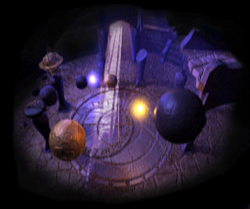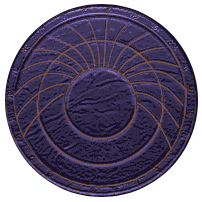Zarok's astronomical clock: Difference between revisions
DansFriend (talk | contribs) |
DansFriend (talk | contribs) (→Dial) |
||
| Line 26: | Line 26: | ||
[[File:MediEvil1998-AstrolabePlateTexture.png|The clock dial.|thumb|left]] | [[File:MediEvil1998-AstrolabePlateTexture.png|The clock dial.|thumb|left]] | ||
====Rim==== | ====Rim==== | ||
The rim of the dial was divided into and inscribed with 24 hours of time. | The rim of the dial was divided into and inscribed with 24 [[wikipedia:hour|equal hours]] of time.<ref name="components">{{Cite web|url=https://catalogue.museogalileo.it/indepth/AstrolabeComponents.html|site=Museo Galileo|title=In depth - Astrolabe components|retrieved=February 6, 2025}}</ref> | ||
==== | ====Tropics and the equator==== | ||
The circle on the outwards perimeter of the dial was the [[wikipedia:Tropic of Cancer|Tropic of Cancer]], while the winter [[wikipedia:Tropic of Capricorn|Tropic of Capricorn]] was represented by the innermost circle. Between them was another circle that represented the [[wikipedia:equator|equator]].<ref name="components"/> | |||
====Unequal hour lines==== | |||
The unequal hour lines were used for determining the [[wikipedia:unequal hours|unequal hours]] of day or night respectively, from the sun's position on the ecliptic.<ref name="components"/> | |||
{{clrl}} | |||
===Zodiacal ring=== | ===Zodiacal ring=== | ||
The zodiacal ring, or the ecliptic ring, showed the annual path of the sun through the sky, as seen from the earth. A belt extending around 6 degrees north and south of the ecliptic was called the zodiac. The apparent motions of the sun and planets took place within the belt. The zodiac was divided into 30-degree intervals giving us the 12 months of the zodiacal calendar.<ref name="astrolabeparts"/> | The zodiacal ring, or the ecliptic ring, showed the annual path of the sun through the sky, as seen from the earth. A belt extending around 6 degrees north and south of the ecliptic was called the zodiac. The apparent motions of the sun and planets took place within the belt. The zodiac was divided into 30-degree intervals giving us the 12 months of the zodiacal calendar.<ref name="astrolabeparts"/> | ||
Revision as of 04:02, 6 February 2025
| Zarok's astronomical clock | |||
|---|---|---|---|

| |||
| The clock in Zarok's planetarium. | |||
| Type | Astronomical instrument | ||
| Appears in | |||
An astronomical clock was a clock with special mechanisms and dials to display astronomical information, such as the relative positions of the sun, moon, zodiacal constellations, and sometimes major planets.
History
14th century
There was an astronomical clock on the floor of the planetarium in Zarok the Sorcerer's castle.[1][a]
Construction
Dial
Rim
The rim of the dial was divided into and inscribed with 24 equal hours of time.[2]
Tropics and the equator
The circle on the outwards perimeter of the dial was the Tropic of Cancer, while the winter Tropic of Capricorn was represented by the innermost circle. Between them was another circle that represented the equator.[2]
Unequal hour lines
The unequal hour lines were used for determining the unequal hours of day or night respectively, from the sun's position on the ecliptic.[2]
Zodiacal ring
The zodiacal ring, or the ecliptic ring, showed the annual path of the sun through the sky, as seen from the earth. A belt extending around 6 degrees north and south of the ecliptic was called the zodiac. The apparent motions of the sun and planets took place within the belt. The zodiac was divided into 30-degree intervals giving us the 12 months of the zodiacal calendar.[3]
Behind the scenes
Inspiration
The design of Zarok's astronomical clock seems to be based on the Prague Orloj, one of the most famous astronomical clocks in the world.
Gallery
Notes
- ↑ The in-game version of the clock only has the clock dial; it does not feature the zodiacal ring or the clock hands. The in-game dial is also upside down relative to the cutscene version.
References
- ↑
 MediEvil. Developed by SCEE Cambridge Studio. Published by Sony Computer Entertainment on October 9, 1998.
MediEvil. Developed by SCEE Cambridge Studio. Published by Sony Computer Entertainment on October 9, 1998.
- ↑ 2.0 2.1 2.2 In depth - Astrolabe components on Museo Galileo. Retrieved February 6, 2025.
- ↑ Cite error: Invalid
<ref>tag; no text was provided for refs namedastrolabeparts
| |||||||||||

